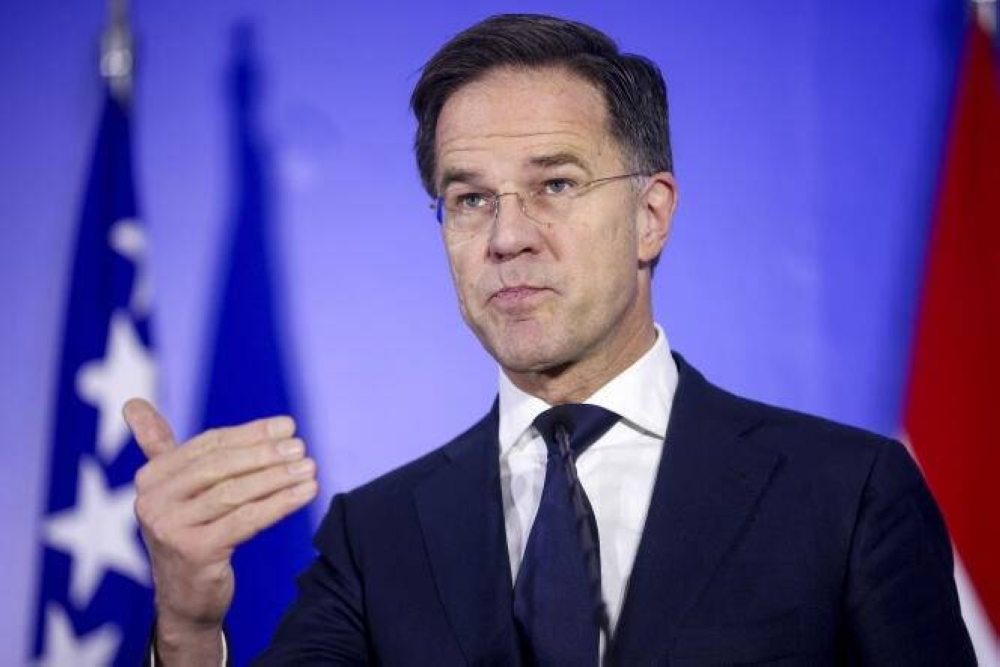New Nato chief Mark Rutte (pictured) has downplayed fears over a potential Donald Trump victory in the US presidential election and pledged to keep backing Ukraine, as he assumed leadership of the world’s most powerful military alliance.
The former Dutch prime minister steps into the role at a pivotal moment, as Russia presses its war in Ukraine, China flexes its growing might – and just weeks before US voters choose a new leader.
“I’m determined to prepare Nato for the challenges of the future,” Rutte said as he formally took over as secretary general from Norway’s Jens Stoltenberg at the North Atlantic Treaty Organisation (Nato)’s Brussels headquarters.
The outcome of the November 5 US vote is set to be the straight-talking 57-year-old’s first major test – and will shape his initial four-year term.
On the campaign trail, former president Trump has threatened not to protect Nato members who do not spend enough on defence and promised a quick deal with Russian President Vladimir Putin to end to the war in Ukraine.
“I’m not worried. I know both candidates very well. I worked for four years with Donald Trump. He was the one pushing us to spend more, and he achieved,” Rutte said. “I will be able to work with both, whatever is the outcome of the elections.”
In opting for the veteran Dutch statesman, a staunch US ally and stalwart backer of Ukraine, Nato’s 32 nations have picked a leader who will keep pushing support for Kyiv and efforts to bolster the alliance’s own defences against Russia.
“Nato will be in safe hands with you at the helm,” said Stoltenberg, who has guided the alliance through one of its most tumultuous decades.
US President Joe Biden said he had full confidence that Rutte “will continue to build on our work to create a Nato that is stronger, larger, and more resolute than ever”.
Rutte listed Ukraine among his priorities – along with ensuring Nato keeps on spending more on defence, and bolstering ties with partners, including the European Union and those in the Asia Pacific.
“Putin has to realise that we will not give in, that we want Ukraine to prevail in the end,” Rutte warned, saying that he wanted “to step up our support for Ukraine and bring it ever closer to Nato”.
“We must sustain this support into the future, because Ukraine’s rightful place is in Nato,” he added.
Ukraine’s President Volodymyr Zelensky pledged to work with Rutte as his country “continues on its path towards full-fledged Nato membership”.
Kyiv faces difficulties as Russian forces advance on the battlefield more than two-and-a-half years after the Kremlin’s all-out invasion.
And there is uncertainty over future Western support for Ukraine with growing calls for a resolution to the conflict.
“It’s up to the Ukrainian government to decide when they are at a stage that they want to discuss peace,” Rutte said. “That’s for later.”
Rutte backed Ukraine’s right to use Western supplied weapons inside Russia, but said it was up to each Nato country to decide on any limitations.
Another central task for Rutte will be to keep pushing Nato members to carry on increasing military spending to counter any potential menace from Moscow.
Spurred on by the war in Ukraine – and pressure from Washington – European countries have already ratcheted up spending.
This year, 23 countries are set to reach Nato’s target of spending 2% of gross domestic product on their militaries.
Stoltenberg, whose mandate was extended three times, trod a careful balancing act as Nato emerged reenergised in the face of Russia’s aggression.
“One thing will not change, and that is Nato’s core mission, and that is to make sure that we defend our people, our nations, and, of course, our values,” Rutte said.
The Kremlin said yesterday that it did not expect any improvement in relations with Nato under Rutte.

